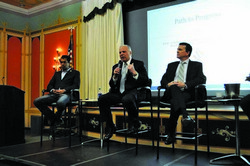Senate President Stephen Sweeny held a town hall meeting to conduct a discussion about fiscal reforms in the “Path to Progress” report in Wilson Auditorium, on Monday, March 11.
The forum was hosted by University President Grey Dimenna, Esq. Panelists included: Senator Vin Gopal, Senate Majority Conference Leader and Chairman of the Bipartisan Legislative Manufacturing Caucus; Senator Declan O’Scanlon; and Peter S. Reinhart, Esq., Director of the Kislak Real Estate Institute at Monmouth University and member of the Fiscal Policy Working Group.
Last January, Sweeney created the Economic and Fiscal Policy Workgroup, whereby legislators and economic advisors discussed New Jersey’s pending fiscal crisis.
Reinhart and 19 other academics or economic and public policy experts were asked for recommendations on how to reform the state.
Reinhart emphasized that the panel was bipartisan. “I don’t think we even knew the politics of anyone involved,” he noted.
“We started the meeting by having a robust debate, eventually forming subgroups on pension, healthcare, and education. We didn’t always agree, but we were able to reach a consensus,” said Reinhart.
Sweeney explained that reform is vital.
“New Jersey is getting in wore fiscal shape. Pensions are in trouble, 4-year institutions are the second most expensive in the country, and we are 48th in the nation as far as investment,” he said.
Every year, the revenue the state generates goes towards pension and healthcare. Education is becoming harder to provide for, Sweeney noted.
Currently, New Jersey has 600 individual school districts teaching to their own standards. Part of the proposed “Path for Progress” solution is the consolidation of schools.
Gopal said, “Regionalization would be a cost-effective way to achieve a higher quality of education.” Legislators have a choice to continue reevaluating the education budget every year, or, make decisions that would improve the system long-term.
O’Scanlon agreed that consolidation for schools would help solve issues in a way that works for taxpayers and public workers. “The bottom line is, if we don’t solve this, public workers will suffer most. It’s your pensions at stake,” he said.
Sweeny assured public workers in attendance that, “The discussion is to change pensions going forward. Not for anyone that’s vested. PA just changed their system, which gave workers choices of a straight 401k or a hybrid.”
“We’re trying to find a way to ensure quality healthcare, keep pensions, but start to make changes. If we don’t and ignore what’s going on here, the budget will have a $4 billion deficit by 2023,” Sweeny said.
Tensions ran high among attendees at the mention of changing pensions. School teachers and social workers took to the microphone to tell their stories and express their concerns.
However, Reinhart believes, “There is cause for optimism. The point of having these workshops is to have these discussions and that itself is a start towards improving New Jersey’s economic state.”
PHOTO COURTESY of Jen Sweet



